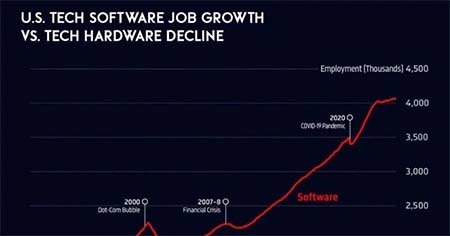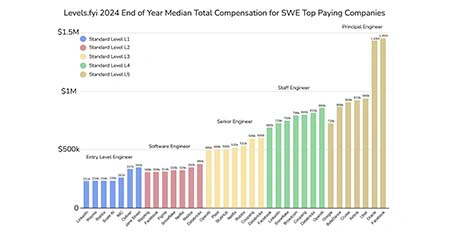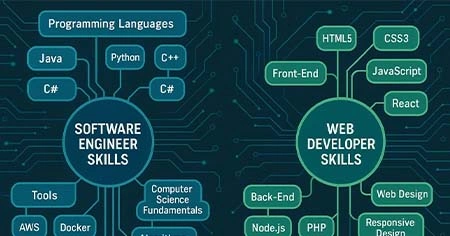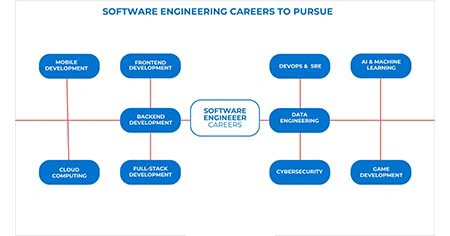Whether you're a software developer entry level candidate or looking to become an entry level software engineer, the choice between these roles can feel overwhelming. The comparison of software engineer vs developer isn't just about job titles—it’s about career direction, responsibilities, and income potential. In this guide, we'll dive into everything from entry level software engineering jobs to junior software engineer positions and remote opportunities like software engineer jobs remote to help you decide.
Additionally, the job market is robust for both professions, with about 327,900 openings projected annually over the next decade. Entry-level software developer jobs and entry-level software engineering positions provide multiple pathways into these lucrative fields. However, educational requirements tend to be substantial – 73 percent of professionals in these roles have bachelor's degrees, while 20 percent hold master's degrees. Despite these similarities, the careers diverge in day-to-day responsibilities, technical skill requirements, and long-term growth potential.
In this guide, we'll compare software engineer vs developer roles across multiple dimensions. Whether you're exploring junior software engineer opportunities or researching software engineer jobs remote options, we'll break down what makes each path unique and help you determine which might be the better fit for your career aspirations.
Daily Work and Responsibilities

The day-to-day activities of software engineers and developers differ substantially, though their paths frequently intersect. Understanding these differences can help you choose the career that best matches your working style and professional aspirations.
For those entering the tech workforce, entry level software developer jobs and entry level software engineering jobs are excellent starting points. A junior software engineer typically collaborates closely with senior engineers and developers, building foundational knowledge in system design. Similarly, a software developer entry level role focuses on writing clean code, debugging, and developing specific application features. These positions often pave the way to mid-level and senior roles.
Team Collaboration: Engineers vs Developers
Software engineers typically operate in highly collaborative environments, working across multiple departments throughout the entire development cycle. They regularly interact with clients to establish overarching project plans and communicate with QA teams to develop test plans and documentation. In larger teams, engineers serve as the architects who create blueprints guiding developers, designers, and other stakeholders.
Conversely, software developers often work more independently, focusing on specific functions at a smaller scale. According to industry professionals, "software developers are given very specific tasks to complete each day," such as building a particular component and delivering code for review. Although developers collaborate with clients and team members, their interactions are typically more targeted—ensuring a specific design meets functional requirements rather than managing the entire system architecture.
Coding Focus: Feature Development vs System Design
The primary distinction in daily coding responsibilities is scope and approach. Software engineers employ a system-level methodology, considering how potential solutions affect the entire system rather than just one component. Their typical day might begin with producing requirement specifications, developing flowcharts, and creating models that illustrate the type of code needed for programmers.
Software developers concentrate on implementing specific features, writing efficient code based on project requirements. They design algorithms and flowcharts for their assigned components, then execute these designs with creativity since they build and execute software solutions within the architecture established by engineers. Developers also spend significant time testing software quality through troubleshooting, debugging, and assessing user experience.
Workplace Settings: Remote vs On-site Roles
Both software engineers and developers can thrive in either remote or on-site environments. Remote work offers substantial benefits including increased flexibility, customizable workspaces, and eliminated commute time. As one remote developer noted, "The lack of commute is hard to undersell," and "I have multiple 32-inch monitors, which makes work so much easier" compared to standard office setups.
On-site environments foster stronger team connections and more efficient communication. In-office engineers and developers benefit from immediate assistance—"if I have a question, my teammate is there to help me"—and stronger networking opportunities. Face-to-face interactions make project communication more efficient, particularly during complex problem-solving that benefits from whiteboarding sessions.
Many companies are now actively hiring for software engineer jobs remote, especially for entry level software engineer and junior software engineer positions. Remote roles are ideal for candidates who prefer flexible work arrangements while still gaining valuable real-world experience.
Nevertheless, each setting has drawbacks. Remote workers may experience isolation, while on-site professionals sacrifice some flexibility and face commuting challenges. Many organizations now offer hybrid models to balance these tradeoffs for both software engineers and developers.
Skill Set and Technical Expertise

The technical capabilities of software engineers and developers reveal significant differences in their approach to mastery, even as their skill sets overlap in fundamental areas.
Programming Languages: Breadth vs Depth
Success in each role requires distinct learning paths when mastering programming languages. Software engineers typically develop extensive knowledge across multiple programming languages, functioning effectively as technical polyglots. In contrast, developers often pursue deeper expertise in specific languages, focusing on mastering particular technologies like Python, Java, or C++.
This breadth-versus-depth dichotomy extends beyond mere language proficiency. As one programmer noted, "Being blinkered to one technology may not be great if you have multiple technologies in play and need to be adaptable to change, especially with Agile projects becoming the norm". Engineers with broader knowledge can more easily pivot between different technology stacks, making them valuable for companies with diverse technical needs.
Problem Solving and Debugging Skills
Both careers demand strong problem-solving abilities, yet their approaches differ substantially. Software developers spend approximately 35-50% of their time debugging and validating code, requiring exceptional patience and analytical thinking. Engineers, meanwhile, typically approach debugging from a systems perspective, tracing issues across multiple components.
Effective debugging techniques include systematic approaches like backtracing, setting strategic breakpoints, and using rubber duck debugging—explaining code line-by-line to an inanimate object to uncover logical flaws. Furthermore, binary search debugging helps narrow down problem areas by methodically eliminating portions of code that function correctly.
Project Management and Leadership Abilities
As careers advance, software engineers often transition into leadership positions requiring team management skills. They frequently collaborate with project managers on timelines and deliverables, designers on user experience concerns, developers on technical implementation, and QA teams on quality standards.
The transition from engineer to project manager typically requires at least three years of software engineering experience. This path demands developing additional skills beyond technical expertise, including estimation, scheduling, effective communication, data analytics, and conflict resolution.
Certifications: Developer vs Engineer Paths
Professional certifications can significantly boost earning potential, with certified IT professionals earning approximately $12,000 more annually. For software engineers, valuable certifications include the CSSLP (Certified Secure Software Lifecycle Professional), Professional Software Developer Certification from IEEE, and cloud-specific credentials like AWS Certified Solutions Architect.
Developers may benefit from language-specific certifications like those from the C++ Institute or function-specific credentials like the MySQL 8.0 Database Developer certification. Both career paths can leverage platform-specific certifications from providers like Microsoft, Google, and Salesforce, depending on their technology focus.
Career Growth and Job Titles

Career progression paths diverge significantly between software engineers and developers, with distinct entry points, advancement opportunities, and compensation structures at each career stage. Starting your journey as an entry level software engineer or software developer entry level hire gives you access to a wide range of growth paths. Whether you're applying for entry level software developer jobs at startups or securing entry level software engineering jobs at enterprise firms, the opportunities are plentiful. Most junior software engineer roles provide mentorship and technical exposure that prepare candidates for mid-level engineering or development roles.
Entry Level Software Developer Jobs vs Entry Level Software Engineering Jobs
First-time developers typically focus on mastering specific programming languages and tools, while entry-level engineers concentrate on building system-level understanding. Beginners in both fields commonly start with bachelor's degrees in computer science or related disciplines—about 73% of working software professionals hold such credentials. Software developers entry level earn approximately $70,000-$85,000 annually, whereas entry level software engineers command slightly higher salaries, averaging $100,265 per year.
Mid-Level Roles: Senior Developer vs Senior Engineer
After 4-6 years of experience, professionals advance to senior positions with distinct responsibilities. Senior developers primarily write high-quality code, mentor juniors, and focus on technical implementation. Senior engineers, consequently, take broader system-level approaches, overseeing entire projects and making architectural decisions. Compensation reflects this difference—senior developers earn approximately $145,000 annually, while senior engineers typically make $144,181-$180,000.
Advanced Roles: Tech Lead vs Engineering Manager
Only about 3.3% of engineers ever become engineering managers, and fewer than 20% transition to tech lead positions. Tech leads maintain coding responsibilities while providing technical direction on projects, whereas engineering managers oversee people and processes with less hands-on coding. This career fork represents a critical decision: continuing technical specialization or shifting toward management. Engineering managers can eventually advance to director positions and potentially chief technology officer roles after 13+ years in the field.
Freelance and Remote Opportunities
Moreover, both career paths offer substantial flexibility through freelance and remote options. Freelance software engineers set their own rates and enjoy geographic freedom. Remote positions in both fields typically offer competitive salaries ranging from $95,000 to $250,000 annually, depending on specialization and experience level. These opportunities generally provide greater work-life balance but may present challenges in team integration and project continuity.
Salary Comparison and Earning Potential

Financial considerations often drive career decisions in the tech industry. When comparing software engineers versus developers, the salary difference is substantial and worth examining in detail.
Median Salary: $80,004 vs $95,195
The salary gap between these roles is significant. Software developers earn a median annual base salary of $80,004 in the United States, with a range between $57,000 and $116,000. In contrast, software engineers command a median annual base salary of $95,195, with a range from $69,000 to $137,000. This represents a difference of over $15,000 annually—a substantial premium for the engineering title.
Notably, other sources report even higher figures, with the Bureau of Labor Statistics indicating a median annual wage of $133,080 for software developers in May 2024. This discrepancy highlights the importance of considering multiple data sources when evaluating potential earnings.
Salary Range by Experience Level
Experience dramatically impacts earning potential in both career paths:
Software Developers:
- Entry-level (0-1 years): $70,454
- Early career (1-4 years): $77,735
- Mid-career (5-10 years): $90,000-$130,000
- Senior (10+ years): $120,000-$180,000
Software Engineers:
- Entry-level: $69,808
- Junior: $81,520
- Mid-career: $110,000-$160,000
- Senior: $152,160
- Principal: $173,827
Industry and Location Impact on Pay
Industry choice substantially affects compensation. Software developers in software publishing earn a median of $143,210, followed by manufacturing ($138,100), finance ($132,900), and computer systems design ($127,880).
Likewise, location creates significant salary variations. Software engineers earn considerably more in tech hubs:
- San Francisco: $161,298
- New York: $152,875
- San Jose: $152,246
- Seattle: $143,223
- Austin: $120,818
Long-Term Earning Potential
Over time, the earning gap between these professions may narrow for specialists. While software engineers typically start with higher salaries, skilled developers in specialized areas can reach similar compensation levels with experience. Both careers benefit from the projected 17% job growth between 2023 and 2033, far exceeding average occupational growth rates.
First-rate software engineers at top companies earn significantly more, potentially exceeding $200,000 annually, especially when including bonuses and stock options ranging from $33,000 to $62,000.
Undeniably, both paths offer excellent financial prospects for those willing to continuously develop their skills and expertise.
Job Outlook and Market Demand

The technology sector continues to offer exceptional career opportunities for both software engineers and developers, with robust growth projected across multiple industries.
Projected Growth: 17% Increase by 2033
The employment landscape for software professionals appears remarkably strong, with the Bureau of Labor Statistics projecting a 17% growth rate for software developers and engineers from 2023 to 2033. This expansion significantly outpaces the average growth rate for all occupations. Approximately 140,100 openings for software developers and quality assurance analysts are anticipated annually over the decade. Some sources report even more optimistic figures, with job postings for engineers with 0-3 years of experience having grown by 47% since October 2023.
According to recent data, entry level software developer jobs remain in high demand across all regions. From hybrid setups to full software engineer jobs remote, companies are adapting to attract fresh talent. Whether you aim to be a junior software engineer or a software developer entry level employee, there's no shortage of opportunities.
In particular, those starting as an entry level software engineer often have more exposure to system-wide thinking early on. These entry level software engineering jobs are ideal for graduates and coding bootcamp alumni.
Entry-level software developer jobs remain plentiful, as evidenced by 71,184 unique job listings for developers with minimal experience posted in a recent year. Subsequently, this creates abundant opportunities for both junior software engineers and those seeking software engineer jobs remote.
Demand Across Industries
The software profession enjoys widespread demand beyond traditional tech companies. The global custom software development market, valued at $43.16 billion in 2024, is projected to reach $146.18 billion by 2030. This represents a remarkable CAGR of 22.6% over the five-year period.
Henceforth, growth remains unevenly distributed across regions:
- Asia Pacific region: Highest projected CAGR from 2025-2030
- European market: Growing at 26.2% CAGR
- U.S. market: Strong growth driven by edge computing and IoT adoption
Both large enterprises and SMEs create substantial demand, with larger corporations accounting for over 60% of the market.
Job Security and Future-Proofing
Amid concerns about AI potentially replacing programming jobs, the evidence suggests software engineers and developers remain secure professions. Contrary to fears, AI tools appear to be streamlining workflows rather than eliminating positions. In fact, the demand for developers skilled in integrating AI solutions into business applications is actively increasing.
For optimal future-proofing, software professionals should focus on developing skills that AI cannot easily replicate—primarily creativity, problem-solving, strategic thinking, and interpersonal abilities. Forthwith, specialized knowledge in cybersecurity, cloud computing, and mobile application development will become increasingly valuable.
As digital transformation accelerates across all business sectors, the outlook for both software engineers and developers remains exceptionally positive through 2033 and beyond.
Comparison Table
| Aspect | Software Engineer | Software Developer |
|---|---|---|
| Median Annual Salary | $95,195 | $80,004 |
| Salary Range | $69,000 - $137,000 | $57,000 - $116,000 |
| Entry-Level Salary | $100,265 | $70,000 - $85,000 |
| Senior-Level Salary | $144,181 - $180,000 | $145,000 |
| Work Approach | System-level methodology oversees the entire architecture | Focuses on specific components and features |
| Team Collaboration | Highly collaborative, works across departments | More independent, focused on specific tasks |
| Primary Focus | System design, architecture planning | Feature development, code implementation |
| Technical Expertise | Broad knowledge across multiple programming languages | Deep expertise in specific languages |
| Problem-Solving Scope | System-wide issue resolution | Component-level debugging and validation |
| Career Progression | Can advance to Engineering Manager, Tech Lead, CTO | Senior Developer, Technical Specialist |
| Educational Background | 73% have bachelor's degrees, 20% hold master's degrees | 73% have bachelor's degrees, 20% hold master's degrees |
| Job Growth (2023-2033) | 17% projected growth | 17% projected growth |
Conclusion
The comparison between software engineers and developers reveals significant differences despite their overlapping skill sets. Certainly, the salary gap stands out most prominently—engineers command approximately $15,000 more annually than developers at the median level. This difference stems primarily from their distinct approaches to software creation. Engineers tackle broader system architecture while developers excel at implementing specific components.
Additionally, career trajectories diverge based on these fundamental differences. Software engineers often progress toward management or architectural leadership roles, whereas developers frequently advance through technical specialization. Both paths, however, offer remarkable financial potential, especially in tech hubs like New York and San Francisco, where compensation packages can exceed $150,000 annually.
Despite these differences, both professions share excellent growth prospects. The projected 17% employment increase through 2033 far outpaces average occupational growth. Furthermore, both roles benefit from abundant remote and freelance opportunities, providing flexibility rarely found in other high-paying careers.
Choosing between these paths ultimately depends on personal strengths and preferences. Those who enjoy system-wide thinking and cross-departmental collaboration might thrive as software engineers. Conversely, professionals who prefer deeper technical specialization and more independent work often find greater satisfaction in developer roles.
Regardless of which path you choose, the technology sector continues to reward both engineers and developers with exceptional compensation, job security, and career advancement opportunities. The key to success in either role lies not merely in technical proficiency but also in developing the problem-solving abilities and adaptability essential for navigating this rapidly evolving field.
FAQs
Q1. What is the salary difference between software engineers and developers?
Software engineers typically earn more, with a median annual salary of $95,195 compared to $80,004 for software developers. However, salaries can vary widely based on experience, location, and industry.
Q2. How do the daily responsibilities differ between software engineers and developers?
Software engineers generally focus on system-level design and architecture, working across departments. Developers tend to concentrate on specific components and features, often working more independently on coding tasks.
Q3. Which role offers better long-term career prospects?
Both paths offer excellent growth potential. Software engineers may advance to leadership roles like Engineering Manager or CTO, while developers can become highly paid specialists. The 17% projected job growth through 2033 indicates strong demand for both professions.
Q4. Do software engineers need broader technical knowledge than developers?
Yes, software engineers typically require a wider range of technical skills across multiple programming languages and systems. Developers often specialize more deeply in specific languages or technologies.
Q5. Are there differences in educational requirements between the two roles?
The educational background is similar for both roles, with about 73% holding bachelor's degrees and 20% having master's degrees. However, software engineering positions may place more emphasis on formal engineering principles and system design concepts.
Q6. What’s the best way to start a tech career today?








